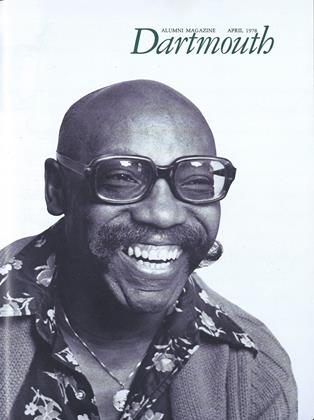"HI, BROTHER." The greeting was a Vermonter's — rolled out without an exclamation point, friendly but hardly effusive — and it was the way Al Foley greeted everybody on Main Street. He did, after all, know "everybody," whether the Main Street was in Hanover where he presided over coffee at Lou's, in Norwich where he lived, in Montpelier where he taught the legislature a lesson in Yankee craft, or in some town like East Rupert where he would go to tell stories at the Grange Hall.
Al Foley died on February 16. His obituary, a formal statement of fact, appeared in our last issue, and it told of his Dartmouth class (1920), "Cowboys and Indians," and how the Glee Club sang "Dartmouth Undying" at his funeral.
Twenty years ago, when we were pea green, Al Foley was already a Presence. Everybody seemed to be taking "Cowboys and Indians," and we did, too. The stories were great. There were few pretensions to lofty scholarship, but most of us can remember the Turner Thesis and what an old bastard Ethan Allen was. It was about this time, too, that we first sang of the juniors being safe at last in the senior class: "They've gone out from Foley's Histr'y." Everybody did.
Like a shrewd Vermonter (actually, he came from Massachusetts), Al Foley honed his Old-Timer stories for wit and wherewithal. "Talk's cheap," he quoted a friend, "but damn it, it takes money to buy rum!" We all have our different images of him — in the classroom, in a reunion tent, at town meeting, on Main Street. Few solemn memories; the stories were the thing — with a shot of wry:
Yankees from the hill-country are notedfor responding to questions by asking oneof their own: "How's your wife?" a neighborinquired. The reply: "Compared towhat?"
I recently overheard Whit Hicks of Danand Whit's Store in Norwich make a replyto a summer resident who had been givinga long order over the telephone.
She had inquired (he told me): "Mr.Hicks, I don't hear anything — are youstill there?"
"Yep," replied Whit. "I write quiet."
There was the experience of the city boyin Vermont, where for the first time in hislife he discovered a toad. He was fascinatedby the little critter and kept poking it witha stick to see it hop, until a local lad, whothought the toad was getting tired of suchtreatment, said, "Leave that tud alone."
"Why should I?" the city kid asked."It's my toad, ain't it?"
"No," said the other youngster. "In Vermont he's his own tud!"
 View Full Issue
View Full Issue
More From This Issue
-
 Feature
FeatureAn Unease on Webster Avenue
April 1978 By Mark Hansen -
 Feature
FeatureMuddling Through Mud Season
April 1978 By Steven L. Calvert -
 Feature
FeatureOur Captivating Compendium
April 1978 -
 Feature
FeatureThe Night Turned Ever Green
April 1978 By CHARLES E. WIDMAYER '30 -
 Article
ArticleAlchemist to the College
April 1978 By S.G. -
 Class Notes
Class Notes1959
April 1978 By DOUGLAS WISE
Article
-
 Article
ArticleTHE MEDICAL SCHOOL AND THE NEW YORK REGENTS
December, 1912 -
 Article
Article"THE BEMA" ELECTIONS
June 1921 -
 Article
ArticleNew Navy Unit
December 1942 -
 Article
Article136 Sons of Alumni in Freshman Class
NOVEMBER 1962 -
 Article
ArticleStatement of Ownership
October 1980 By DENNIS A. DINAN, Editor -
 Article
ArticleDARTMOUTH IN THE RECENT NEW HAMPSHIRE LEGISLATURE
April 1919 By Harlan C. Pearson '93

